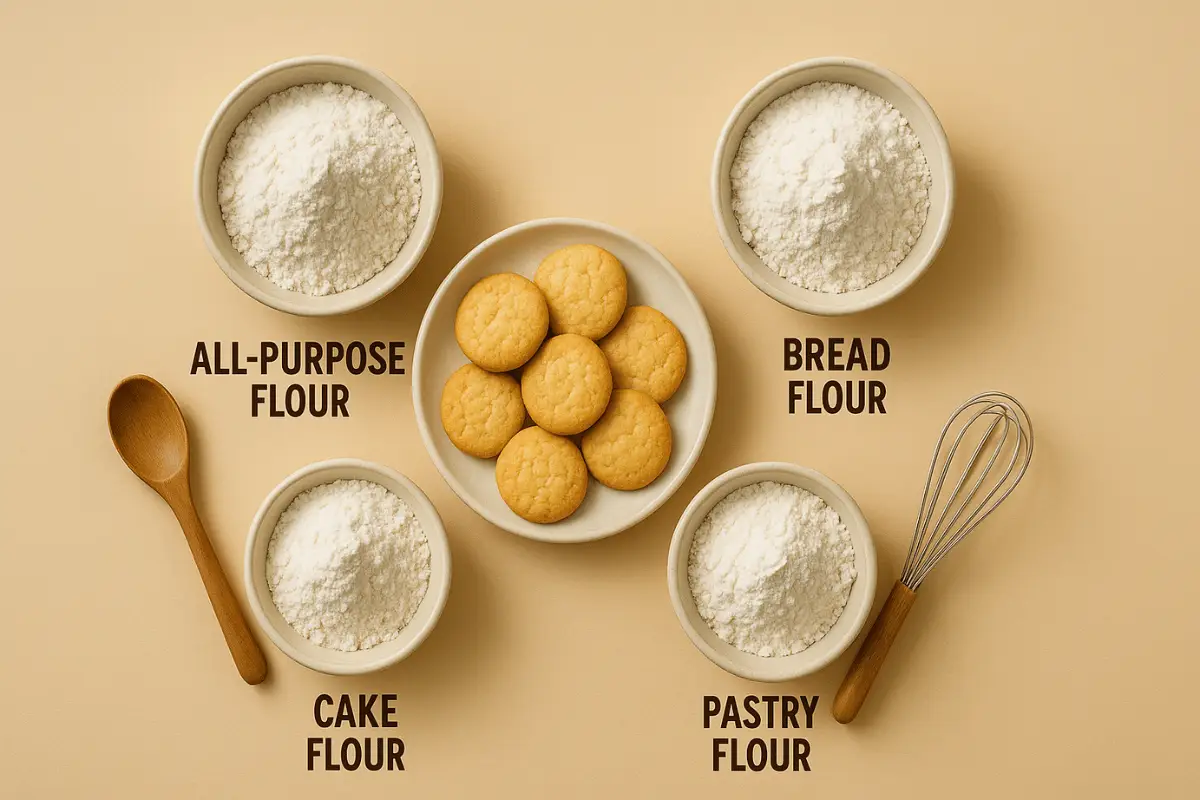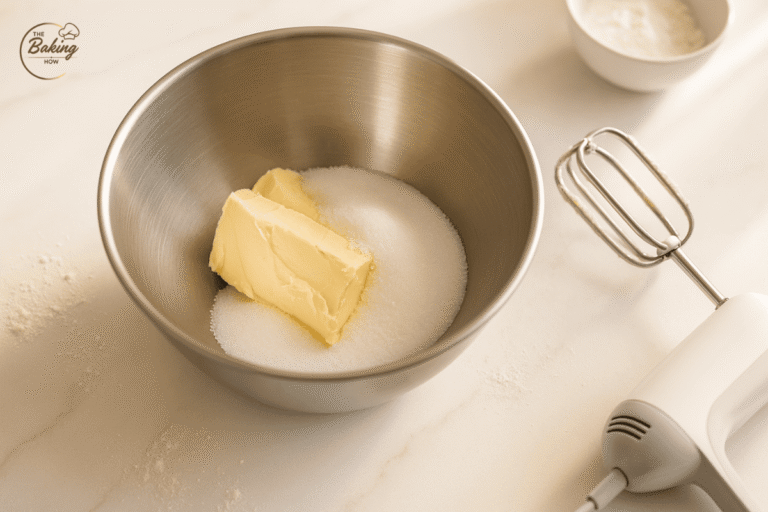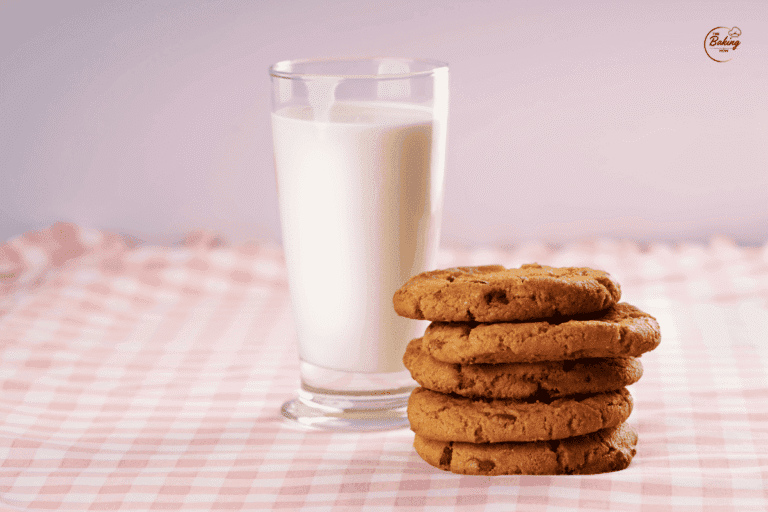Best Flour for Cookies: How to Choose the Right One for Perfect Texture

When it comes to baking the perfect batch of cookies, the choice of best flour for cookies can make all the difference. As any experienced baker knows, the flour you use significantly impacts the texture, taste, and overall success of your cookies. Whether you’re aiming for chewy, crispy, or soft cookies, the right flour plays a crucial role in achieving the ideal consistency. For a better understanding of how ingredients affect your cookies, check out our guide on how ingredients affect cookie texture.
“After 17 years in the cookie industry, I’ve learned that the single most important ingredient for perfecting texture is your choice of flour. I had countless opportunities to experiment with different flours, fine-tuning the balance to get the perfect cookie every time. From understanding the science behind flour to knowing when to use all-purpose flour, cake flour, or even bread flour, these decisions directly influence how your cookies turn out.
In this guide, I’ll walk you through the best flour for cookies, the differences between various types of flour, and how to choose the right one for your specific baking needs. Whether you’re a beginner or an experienced baker, knowing the right flour to use can elevate your cookie-making game.
Key terms covered in this post will include bleached flour, unbleached flour, cake flour, bread flour, and pastry flour, all of which play a significant role in cookie baking. By the end of this article, you’ll have a deeper understanding of how flour can transform your cookie recipes and how to select the perfect one for your next batch.
What is the Best Flour for Cookies?
Choosing the best flour for cookies isn’t just about picking the most commonly available option — it’s about selecting the right type of flour that aligns with your desired cookie texture, flavor, and consistency. The “best” flour for cookies is determined by several factors, including protein content, texture, and how it interacts with other ingredients in the dough. For a refresher on basic cookie ingredients, see our post on basic cookie ingredients.
Flour is categorized by its protein content, which affects the gluten formation. The higher the protein, the chewier and denser the cookie will be. Conversely, lower-protein flours lead to more delicate and tender cookies. The key types of flour used in cookie baking are all-purpose flour, cake flour, and bread flour, each serving a specific purpose:
Industry Insight: 🏭
As an industry expert with 17 years of experience in the cookie business, I can tell you that, in large-scale cookie production, we typically use low-gluten flours with a protein content of about 8-9%. These flours have low water absorption (55-60%), which is key to achieving the perfect texture without over-drying or spreading too much. For troubleshooting cookie texture, you can also see our guides on why are my cookies dry and crumbly and why are my cookies too soft.
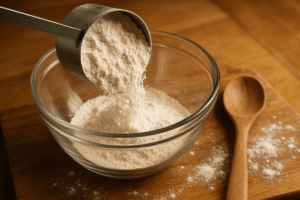
Understanding Different Types of Flour for Cookies
The type of flour you use in cookies depends on the desired texture and the specific recipe. Different flours contain different amounts of protein, which affects how much gluten they form. The more gluten, the chewier the cookie; the less gluten, the more tender and delicate it will be. Here’s an overview of the four main types of flour used for cookies:
All-Purpose Flour 🍪
All-purpose flour is the most common and versatile flour for cookie baking. It contains moderate protein content (10-12%), which makes it ideal for most cookie recipes. All-purpose flour provides a balanced texture, giving cookies just the right amount of chewiness and tenderness without being too soft or too dense.
- Ideal for: Chocolate chip cookies, sugar cookies, and snickerdoodles.
For more on cookie baking techniques, see cookie baking mistakes.
Cake Flour 🎂
Cake flour has a lower protein content (7-9%), which makes it a light and delicate flour. This flour is ideal for cookies that need a tender, soft texture. Cake flour works wonderfully in recipes where you want a more fragile, melt-in-your-mouth cookie, like shortbread or sugar cookies.
- Ideal for: Soft, delicate cookies like shortbread or sugar cookies.
Bread Flour 🍞
Bread flour is a high-protein flour (12-14%) that is perfect for cookies that need to be chewier. The extra protein content helps create more gluten, giving the cookies a denser, chewier texture. Bread flour is great for cookies that need to hold their shape or be slightly thicker, like oatmeal cookies or cookie bars.
- Ideal for: Chewy, thicker cookies like oatmeal cookies and cookie bars.
Pastry Flour 🥐
Pastry flour is lower in protein than all-purpose flour (8-9%) but higher than cake flour. It’s perfect for cookies that require a tender, light texture while still maintaining some structure. Pastry flour is often used in cookies that need to be both soft and slightly crisp, giving a balanced texture ideal for shortbread cookies and butter cookies.
- Ideal for: Tender cookies like shortbread and butter cookies.
Industry Insight🏭
In the cookie industry, we use different flours for different types of cookies to achieve the perfect texture. For soft cookies, we typically use low-gluten flour with 8-9% protein to get that tender, delicate result. For crackers and molded biscuits, we opt for high-gluten flour (9-10%) to create a firmer, more structured texture. Understanding these differences helps us produce cookies with the desired qualities every time. For more on how ingredients affect cookie texture, see how ingredients affect cookie texture.
| Flour Type | Protein Content | Best For | Resulting Texture |
|---|---|---|---|
| All-Purpose | 10-12% | Most cookies, chocolate chip | Balanced, soft, and chewy |
| Cake Flour | 7-9% | Shortbread, sugar cookies | Tender, delicate, soft |
| Bread Flour | 12-14% | Oatmeal cookies, cookie bars | Chewy, dense, thick |
| Pastry Flour | 8-9% | Shortbread, butter cookies | Tender, light, slightly crisp |

Try entering different flour types in our cookie texture calculator by The Baking How to see how protein content changes cookie chewiness.
Bleached vs Unbleached Flour for Cookies
The choice between bleached and unbleached flour is a common question when baking cookies. While both types of flour come from the same wheat, the key difference lies in how they are processed, which can affect the texture and flavor of your cookies.
What is Bleached Flour? 💡
Bleached flour is treated with chemicals (usually chlorine or benzoyl peroxide) to whiten the flour and soften the texture. This process speeds up the aging of the flour, which gives it a finer texture that works well for certain types of cookies.
- Texture: Produces softer, lighter cookies due to the finer grain.
- Ideal for: Cookies that need to be light and delicate, like sugar cookies or shortbread.
- Flavor: Some bakers feel that bleached flour imparts a slightly neutral taste, as the bleaching process removes some of the natural wheat flavor.
What is Unbleached Flour? 🌾
Unbleached flour is not chemically treated and retains its natural, creamy color. It ages naturally over time, and the grain is slightly coarser than bleached flour. It is higher in nutrients and tends to have a slightly stronger wheat flavor.
- Texture: Slightly denser and more robust texture than bleached flour, giving a chewier cookie.
- Ideal for: Recipes where a chewier, heartier cookie is desired, such as chocolate chip cookies.
- Flavor: Retains a bit more of the wheat flavor, contributing to a more authentic, nutty taste in cookies.
Impact of Bleaching on Cookie Texture and Flavor ⚖️
While the bleaching process has little impact on the nutritional value of flour, it softens the grain, making it easier to blend with other ingredients. For cookies that require a delicate texture, bleached flour works best, as it leads to a lighter and airier bite. However, for cookies that need a chewier texture (like chocolate chip cookies), unbleached flour is the better choice. The coarser texture of unbleached flour also helps cookies maintain their shape and structure. More insights on cookie texture are available in why are my cookies flat and why do my cookies spread too much.
Industry Insight:🏭
From my experience in the cookie industry, we often choose unbleached flour for chewy cookies because of its more robust texture and wheat flavor. For cookies like sugar cookies or shortbread, bleached flour is preferred for its lighter, softer consistency, which leads to the desired melt-in-your-mouth result.
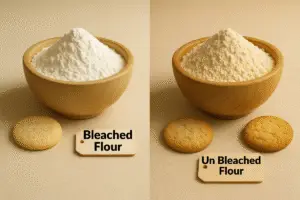
Best Flour for Chocolate Chip Cookies 🍪
To show you the real-world difference flour makes, I baked the same classic chocolate chip cookie recipe with three different flours: all-purpose, bread, and cake. The visual and textural differences were immediate. Here’s what happened.
When baking chocolate chip cookies, the type of flour you use can make a significant difference in the texture and overall quality of the cookie. Some flours create chewier cookies, while others result in crispier ones. Let’s explore the best flour for making perfect chocolate chip cookies.
Why Flour Matters in Chocolate Chip Cookies 🧐
Flour contributes to the structure and chewiness of chocolate chip cookies. Choosing the right type of flour will ensure that your cookies have the right balance of softness, texture, and flavor. For chocolate chip cookies, you want a flour that will allow the dough to hold shape, provide softness in the center, and create a slightly crisp edge.
Best Flour Choices for Chocolate Chip Cookies 🌾
- All-Purpose Flour
All-purpose flour is the most popular choice for making chocolate chip cookies, and it provides a balanced texture. It’s great for producing cookies with just the right amount of chewiness and spread.
- Cookie Texture: Chewy and slightly crispy around the edges.
- Why It Works: It has a moderate protein content (10-12%), which results in cookies with good structure while still allowing for a soft interior.
- Cookie Texture: Chewy and slightly crispy around the edges.
- Bread Flour
If you’re after a chewier texture in your chocolate chip cookies, bread flour is a great choice. With a higher protein content, it creates cookies that are thicker and have a more substantial feel.
- Cookie Texture: Thicker, chewier, and denser cookies.
- Why It Works: The higher protein content (12-14%) increases gluten development, resulting in cookies with more structure and chew. Check out also from King Arthur Baking
- Cookie Texture: Thicker, chewier, and denser cookies.
- Pastry Flour
While not a common choice for chocolate chip cookies, pastry flour can be used to make more delicate cookies. It’s often too soft for standard chocolate chip cookies but works for creating a lighter texture.
- Cookie Texture: Tender, soft, and more crumbly.
- Why It Works: Lower protein content makes it ideal for cookies that are intended to be soft and fluffy, but not the best choice for chocolate chip cookies that need chewiness.
- Cookie Texture: Tender, soft, and more crumbly.
Best Flour for Classic Chocolate Chip Cookies
For most chocolate chip cookie recipes, all-purpose flour is the ideal choice. It provides the perfect balance between softness and chewiness. If you prefer a denser and chewier cookie, then bread flour can be a great alternative. Pastry flour can be experimented with for a softer, more delicate texture, though it’s generally not recommended for traditional chocolate chip cookies.
Industry Insight:🏭
With my 17 years of experience in the cookie industry, we’ve found that all-purpose flour works best for most chocolate chip cookies. However, if you’re looking to adjust the texture for chewier cookies, bread flour is a great option to experiment with.

Special Flours for Different Cookie Recipes 🍪
Sometimes, you might want to go beyond the classic all-purpose flour to create cookies with unique textures or meet dietary requirements. Here, we’ll explore some specialty flours that work well for more delicate cookies or specific dietary needs.
Pastry Flour for Delicate Cookies 🌸
Pastry flour is ideal for cookies that need a lighter and more tender texture. It’s perfect for recipes like shortbread, thumbprint cookies, and sugar cookies, where a soft, melt-in-the-mouth experience is key.
- Cookie Texture: Soft, delicate, and slightly crumbly.
- Why It Works: Pastry flour has a lower protein content (about 8%), which results in a more tender and fragile texture. It’s ideal for cookies that shouldn’t have too much chewiness or structure.
Popular Use: Pastry flour is most commonly used in delicate, fine-textured cookies like shortbread or butter cookies, where the goal is to create a melt-in-your-mouth experience without the chewiness associated with high-gluten flours.
Flour Alternatives for Gluten-Free or Low-Carb Cookies 🥄
For those who have dietary restrictions, flour alternatives can be a great way to enjoy cookies without gluten or excess carbs. Here are some popular alternatives:
- Almond Flour 🥜
Almond flour is a great gluten-free option that can be used to create moist, tender cookies. It has a nutty flavor that pairs well with cookies like almond flour chocolate chip or macaron-style cookies.- Cookie Texture: Tender, moist, with a slight nutty flavor.
- Best For: Gluten-free cookies, especially those that need a rich and nutty flavor.
- Cookie Texture: Tender, moist, with a slight nutty flavor.
- Coconut Flour 🥥
Coconut flour is another popular gluten-free alternative. It is highly absorbent and should be used in conjunction with extra liquid in the recipe.- Cookie Texture: Dense and crumbly.
- Best For: Gluten-free cookies or low-carb options, as it adds a subtle coconut flavor.
- Cookie Texture: Dense and crumbly.
- Chickpea Flour 🌾
Chickpea flour has recently become popular in low-carb and gluten-free baking. It’s great for cookies that need a chewy texture, such as chickpea flour chocolate chip cookies.- Cookie Texture: Chewy and dense.
- Best For: Low-carb and gluten-free cookies with a slightly earthy flavor.
- Cookie Texture: Chewy and dense.
- Oat Flour 🌾
Oat flour is made from ground oats and is a great option for gluten-free cookies. It provides a soft texture and a mildly sweet flavor, perfect for oatmeal-based cookies or cookies with nuts and dried fruit.- Cookie Texture: Soft and moist.
- Best For: Oatmeal cookies, low-carb, or gluten-free options.
- Cookie Texture: Soft and moist.
Best Flour for Baking Cookies (Alternative Options) 🥣
When you’re exploring specialty flours or alternatives, it’s essential to consider both the texture and the flavor each flour brings to your cookies. Whether you’re going for delicate pastry flour or opting for gluten-free alternatives like almond flour or coconut flour, there’s a wide variety of options to create a diverse range of cookie textures and tastes.
Industry Insight:🏭
With over 17 years of experience in the cookie industry, we often use pastry flour for delicate cookies like shortbread, and we recommend almond flour for those seeking gluten-free options. Choosing the right specialty flour for your recipe ensures you get the best flavor and texture that aligns with your dietary needs.
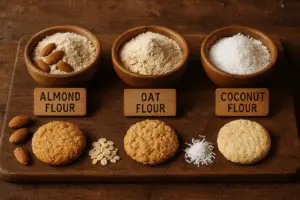
Can You Use Cake Flour for Cookies? 🍰
Cake flour is typically associated with light and airy cakes, but did you know it can also be used for cookies? While it’s not the go-to flour for all cookie recipes, cake flour can be a game-changer for certain types of cookies. Let’s explore when and why you should use cake flour for cookies.
When to Use Cake Flour in Cookies?
Cake flour has a low protein content (about 7–8%) compared to all-purpose flour, which makes it a great choice for tender and delicate cookies. If your goal is to create a cookie that is soft and cakey, cake flour can help you achieve that texture.
- Ideal For: Soft, tender cookies like sugar cookies, shortbread, or frosted cookies.
- Why It Works: Cake flour’s low protein content results in a more delicate structure, leading to cookies that are softer and less chewy than those made with all-purpose flour. This makes it perfect for recipes that aim for a melt-in-your-mouth experience rather than a chewy or crispy texture. Learn more about proper cookie chilling in how long to chill cookie dough before baking.
What Happens When You Use Cake Flour for Cookies?
When using cake flour, you’ll notice that your cookies have a more light, fluffy texture with a subtle tenderness. This flour is particularly effective in recipes where you want to avoid a dense, chewy cookie texture. It helps produce cookies that are softer and more crumbly, which works well for certain cookie types, especially if you’re looking for a shortbread-style or sugar cookie finish.
- Texture: Soft, tender, and slightly crumbly.
- Best For: Sugar cookies, shortbread, delicate butter cookies, and cookies that require a fluffier consistency.
What to Consider When Using Cake Flour for Cookies
While cake flour is fantastic for creating delicate cookies, it’s not suitable for all recipes. For example, if you’re making a chewy cookie like a chocolate chip cookie, cake flour might not give you the desired texture. In these cases, all-purpose flour or bread flour will likely give you better results.
- Not Ideal For: Chewy cookies like chocolate chip or oatmeal raisin cookies.
- Why It Might Not Work: Cake flour lacks the protein needed for building the structure of chewy cookies. The texture may come out too soft and may not hold up as well when combined with heavier mix-ins like chocolate chips or nuts.
Key Takeaway: Can You Use Cake Flour for Cookies?
Yes, you can use cake flour for cookies, but it’s best suited for recipes where a soft, tender texture is desired. If you’re looking for a light, delicate cookie that’s slightly crumbly and melts in your mouth, cake flour is a great option.
Industry Insight🏭
Having been in the cookie industry for over 17 years, we use cake flour in recipes that demand a light, tender texture. For example, when crafting shortbread cookies, sugar cookies, or any delicate biscuit, cake flour helps achieve the perfect melt-in-your-mouth consistency.
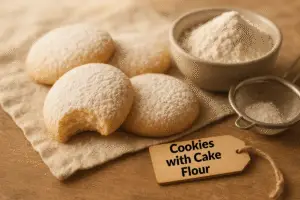
How to Choose the Best Flour for Your Cookie Recipe? 🍪
Choosing the right flour is crucial for achieving your desired cookie results. Whether you want soft, chewy, crisp, or tender cookies, the type of flour you use can make all the difference. In this section, we’ll discuss tips on selecting flour based on texture, taste, and the specific cookie recipe you’re working with.
1. Consider the Desired Texture
The texture of your cookies—whether they’re chewy, crisp, or tender—depends heavily on the flour you choose. Here’s a breakdown of how different flours impact texture:
- Chewy Cookies: If you’re aiming for chewy, thick cookies, bread flour or all-purpose flour is the best choice. Bread flour higher protein content provides the necessary gluten for a chewy bite.
- Tender Cookies: For delicate, soft cookies, cake flour or pastry flour is ideal. These flours have a lower protein content that results in a tender texture.
- Crisp Cookies: If you want your cookies to be crisp, all-purpose flour or a combination of all-purpose flour and corn starch will work well to create a crispy texture.
2. Consider the Taste
Flour can subtly affect the taste of your cookies. For example:
- Bleached Flour: It tends to produce cookies with a whiter color and a slightly softer texture but may alter the flavor slightly.
- Unbleached Flour: It often has a slightly more robust flavor and denser texture.
- Specialty Flours: Flours like almond flour or coconut flour add unique flavors and can be used in gluten-free or low-carb cookie recipes.
3. Choose Flour Based on the Type of Cookie
Different cookies require different types of flour. Here’s how to match flour to your cookie recipe:
- Classic Cookies (like Chocolate Chip): All-purpose flour works perfectly for a balanced texture between chewy and crisp.
- Delicate Cookies (like Shortbread): For cookies that are meant to be delicate, go with cake flour or pastry flour for a soft and tender texture.
- Crispy or Biscuit-like Cookies: Use all-purpose flour for a crispier finish, especially when combined with a bit of cornstarch.
4. How Humidity and Altitude Affect Flour Choice
Your environment can also play a role in selecting the right flour. Factors like humidity and altitude can affect the moisture content of your dough and how the flour performs.
- Humidity: In high humidity areas, flour tends to absorb more moisture, so you may need to use slightly less flour or adjust your wet ingredients. Also, bread flour may help achieve the desired consistency in more humid environments.
- Altitude: At higher altitudes, the air is drier, and flour can behave differently. You may need to increase flour slightly or reduce sugar to maintain texture. Some bakers also recommend using a bit more bread flour or all-purpose flour for better structure at high altitudes.
5. General Tips for Choosing Flour
- Start with All-Purpose Flour: If you’re unsure, all-purpose flour is a reliable choice for most cookie recipes. It provides a balance between tenderness and chewiness.
- Specialty Flours for Specific Needs: If you have specific dietary needs, consider using gluten-free flours or low-carb flours. Almond flour, rice flour, or coconut flour can help in these cases.
Industry Insight: 🏭
From 17 years of experience in the cookie industry, we’ve learned that the right flour is crucial for delivering cookies with the perfect texture. At our bakery, we carefully select flours based on humidity, altitude, and the desired cookie type to ensure each batch of cookies comes out as perfect as possible. Low-gluten flours are used for soft cookies, while higher-gluten flours are essential for cookies that need a bit more chew. We always test flour in our lab for moisture, gluten and water absorption before unloading.
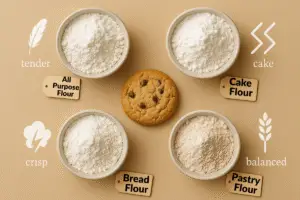
Conclusion: Choosing the Best Flour for Your Cookies 🍪
Selecting the right flour is more than just a technical step in the baking process; it’s the key to achieving the perfect cookie. Whether you’re aiming for a chewy chocolate chip cookie, a delicate shortbread, or a crisp biscuit, the flour you choose will directly affect the texture, flavor, and overall success of your recipe.
By understanding the different types of flour—such as all-purpose flour, cake flour, bread flour, and pastry flour—you can tailor your baking to meet your specific cookie goals. Don’t forget to also consider the variations between bleached vs unbleached flour and how each can impact your cookie’s final result.
Experiment and Find Your Perfect Flour
The beauty of baking cookies is the freedom to experiment. Try out different types of flour and combinations to find what works best for your unique cookie recipes. Whether you’re baking for a special occasion or just for fun, playing with different flour types will help you discover your perfect cookie texture and flavor.
Ready to bake the perfect batch of cookies? 🧑🍳🍪 Explore our baking tools and cookie recipes on The Baking How for more tips, tools, and tried-and-true recipes that’ll make you a cookie expert!

